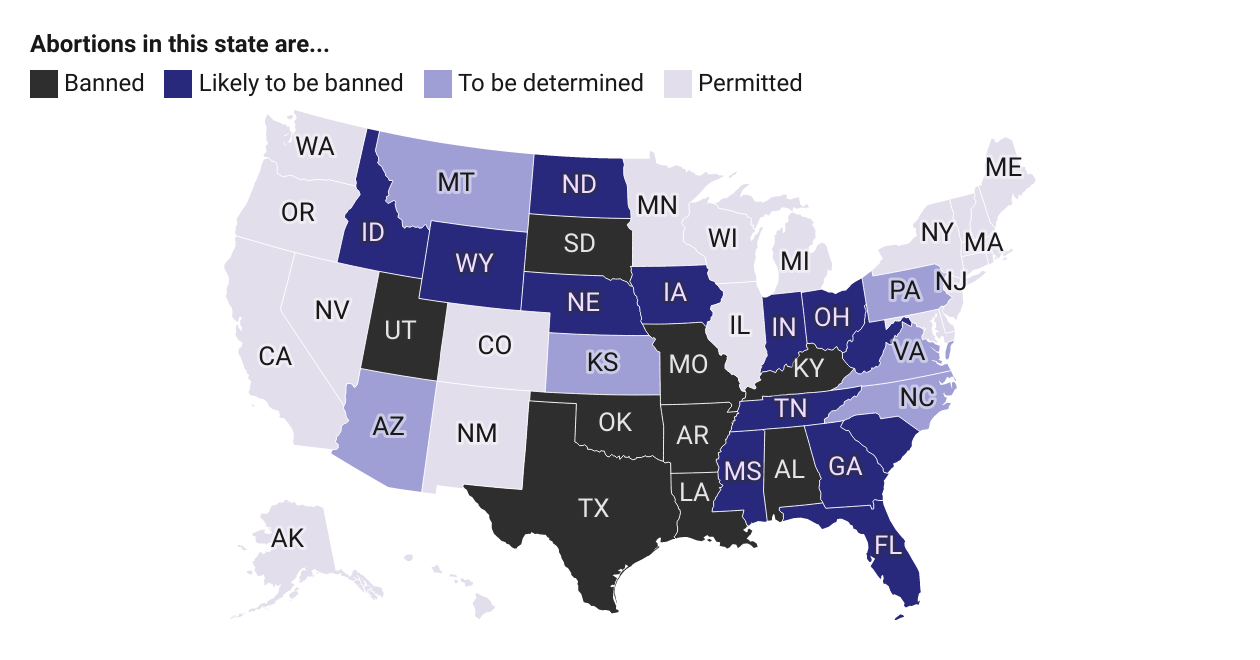French lawmakers on Monday overwhelmingly approved a bill to enshrine abortion rights in France's constitution, making it the only country to explicitly guarantee a woman’s right to voluntarily terminate a pregnancy.
The historic move was proposed by President Emmanuel Macron as a way to prevent the kind of rollback of abortion rights seen in the United States in recent years, and the vote during a special joint session of parliament drew a long standing ovation among lawmakers.
The measure was approved in a 780-72 vote in the Palace of Versailles. Abortion enjoys wide support in France across most of the political spectrum, and has been legal since 1975.
Many female legislators in the hall smiled broadly as they cheered. There also were jubilant scenes of celebrations all over France as women’s rights activists hailed the measure promised by Macron immediately following the Dobbs ruling by the U.S. Supreme Court in 2022.
Get top local stories in Connecticut delivered to you every morning. Sign up for NBC Connecticut's News Headlines newsletter.
Both houses of parliament, the National Assembly and the Senate, had already separately adopted a bill — as required — to amend Article 34 of the French Constitution. The measure specifies that “the law determines the conditions by which is exercised the freedom of women to have recourse to an abortion, which is guaranteed.”
The French measure is seen as going a step further in its guarantee of abortion rights than was the case in the former Yugoslavia, whose 1974 constitution said that “a person is free to decide on having children.” Yugoslavia dissolved in the early 1990s, and all its successor states have adopted similar measures in their constitutions that legally enable women to have an abortion, though they do not explicitly guarantee it.
In the lead up to the historic vote, French Prime Minister Gabriel Attal addressed the 925 lawmakers gathered for the joint session in Versailles, and called on them to make France a leader in women's rights and set an example for countries around the world.
“We have a moral debt to women,” Attal said. He paid tribute to Simone Veil, a prominent legislator, former health minister and key feminist who in 1975 championed the bill that decriminalized abortion in France.
“We have a chance to change history,” Attal said in a moving and determined speech. “Make Simone Veil proud," he said to a standing ovation.
The Assembly overwhelmingly approved the proposal in January, and the Senate adopted it on Wednesday. A three-fifths majority in the joint session also was required for the measure to be written into the constitution.
None of France’s major political parties have questioned the right to abortion, including Marine Le Pen’s far-right National Rally party and the conservative Republicans.
Le Pen, who won a record number of seats in the National Assembly two years ago, said on Monday that her party planned to vote in favor of the bill but added that “there is no need to make this a historic day.”
A recent poll showed support for abortion rights among the French public at more than 80%, consistent with previous surveys. The same poll also showed that a solid majority of people are in favor of enshrining it in the constitution.
There were scenes of celebrations around France even before the joint parliamentary session began.
Sarah Durocher, a leader in the Family Planning movement, said Monday's vote is “a victory for feminists and a defeat for the anti-choice activists.”
With the right to an abortion added to the constitution, it will be much harder to prevent women from voluntarily terminating a pregnancy in France, women’s rights and equality activists said.
“We increased the level of protection to this fundamental right,” said Anne-Cécile Mailfert of the Women’s Foundation. “It’s a guarantee for women today and in the future to have the right to abort in France.”
The government argued in its introduction to the bill that the right to abortion is threatened in the United States, where the Supreme Court in 2022 overturned a 50-year-old ruling that used to guarantee it.
“Unfortunately, this event is not isolated: In many countries, even in Europe, there are currents of opinion that seek to hinder at any cost the freedom of women to terminate their pregnancy if they wish,” the introduction to the French legislation says.
The decision by the U.S. Supreme Court to strip women of the right to abortion has reverberated across Europe’s political landscape, forcing the issue back into public debate in France at a time of political upheaval.
Mathilde Philip-Gay, a law professor and a specialist in French and American constitutional law, warned against easing the pressure on legislators for women's rights as far-right parties — determined to curtail women's rights — gain political influence and are elected to form governments around Europe and elsewhere.
"It may not be an issue in France, where a majority of people support abortion,” Philip-Gay said. “But those same people may one day vote for a far-right government, and what happened in the U.S. can happen elsewhere in Europe, including in France.”
Inscribing abortion into the French Constitution "will make it harder for abortion opponents of the future to challenge these rights, but it won't prevent them from doing it in the long run, with the right political strategy,” Philip-Gay added.
"It only takes a moment for everything we thought that we have achieved to fade away,” said Yael Braun-Pivet, the first female president of the French parliament, in her address to the joint session.
Amending the constitution is a laborious process and a rare event in France. Since it was enacted in 1958, the French Constitution has been amended 17 times. The last time was in 2008, when parliament was awarded more powers and French citizens were granted the right to bring their grievances to the Constitutional Court.
Barbara Surk reported from Nice.



